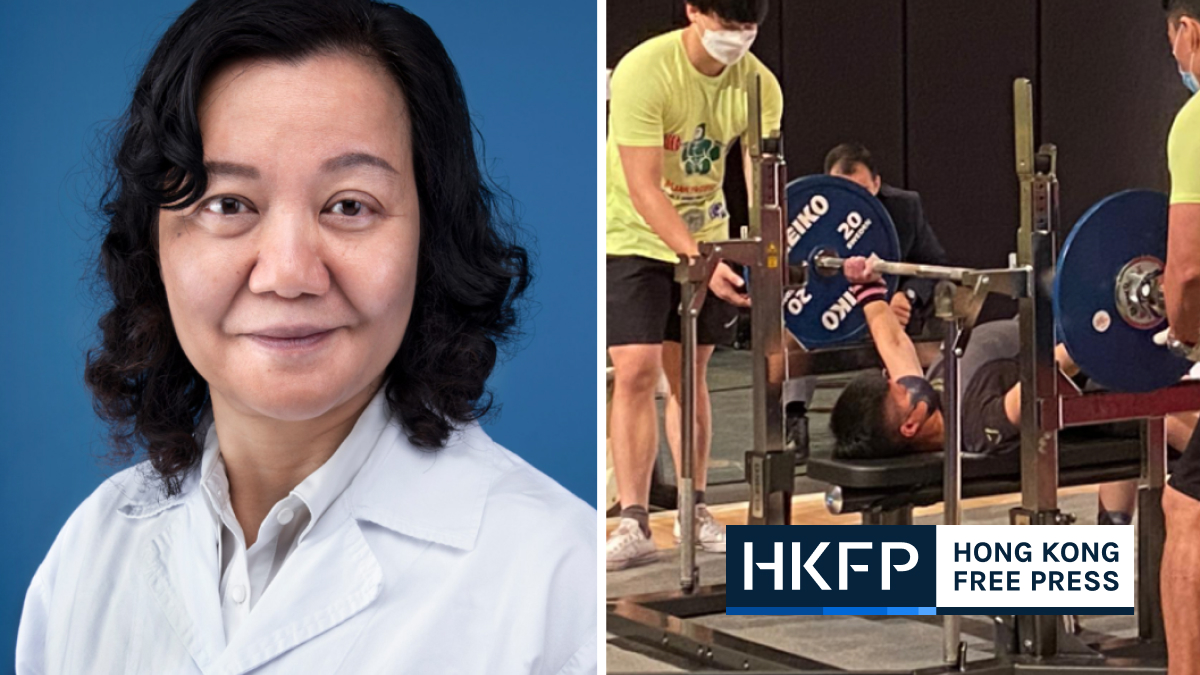Two former members of the defunct Hong Kong Confederation of Trade Unions (HKCTU) – once the city’s largest pro-democracy union coalition – have applied for police approval to organise a public demonstration on Labour Day.

Former HKCTU chairperson Joe Wong and committee member Denny To announced in a Facebook post on Tuesday afternoon that they had filed an application to host a Labour Day rally “in their own names.” Anyone seeking to organise a public procession of more than 30 people in Hong Kong must apply for a police letter of no objection.
To told local media that they had applied to march from Victoria Park in Causeway Bay to the Central Government Offices in Admiralty at 3 p.m. on May 1, with the maximum size of the rally set at 500.
While some small-scale public gatherings have recently been granted police approval, they have been subject to stringent measures. At Hong Kong’s first authorised protest against a government policy in about two years, demonstrators were made to wear numbered tags and carry their own cordon lines.
Earlier this month, the city’s security chief defended the use of identity tags, saying that police must implement “suitable measures” based on their assessment of potential risk, adding that there were still those who hoped to “stir up chaos” at public events. He did not elaborate as to who the people might be.
Speaking to Commercial Radio on Wednesday morning, Wong said he hoped the authorities could treat their application with an open mind and apply less stringent requirements.
“A protest… shows how much freedom a city has. If conditions are placed on a demonstration, that makes it appear less free, and will, in fact, affect people’s perception of Hong Kong,” Wong added.
To told InMedia that he was not worried their proposed march would be hijacked by “violent groups,” adding that “nowadays the social atmosphere is ordinary, I cannot see where the radical people are.” He also said they would not agree to wearing numbered tags and hoped there may be alternatives.

Before the Covid-19 pandemic began in 2020, Hong Kong would see large-scale Labour Day demonstrations every year with participants from across the political spectrum.
That year, eight democrats – including former lawmakers Leung Kwok-hung and Lee Cheuk-yan – marched on May 1. They were subsequently found guilty of violating the Covid-related gathering limit in place at the time and received a suspended 14-day sentence.
The group gathering limit was abolished together with a number of Covid-19 regulations towards the end of last year.
In the Tuesday statement, the two unionists said that workers could only make changes to an “unjust societal structure” by uniting to put pressure on the rich and powerful.
“Some public figures who claim to stand for labour rights say demonstrations and protests are not important, as workers have other means to be heard and the government listens to opinions – if changing society were this easy, the world would be rid of labour problems,” the statement read.
“Regardless of how much room is left, or how much can be accomplished in Hong Kong’s society nowadays, what matters the most is to continue the spirit of [the Labour Day,].”

In a reply to HKFP on Wednesday morning, the police confirmed that they had received a notice from members of the public proposing to host a public event on Hong Kong Island on May 1. A spokesperson said police were currently handling the matter.
“After the police receive the notice from the organiser, we will conduct a comprehensive risk assessment based on factors including the purpose and nature of the event, the number of participants, past experience and the latest circumstances. Depending on the results of that risk assessment, the police will adopt appropriate measures to handle the public event in question,” the police added.
Both Wong and To were among the ex-HKCTU members taken by national security police to assist an investigation last month, after former chief executive of the union coalition Elizabeth Tang was arrested on suspicion of foreign collusion.
The HKCTU announced its decision to disband citing threats to members’ safety in September 2021. It was among the 50-some civil society groups that folded in the wake of the Beijing-imposed national security law.
In June 2020, Beijing inserted national security legislation directly into Hong Kong’s mini-constitution – bypassing the local legislature – following a year of pro-democracy protests and unrest. It criminalised subversion, secession, collusion with foreign forces and terrorist acts, which were broadly defined to include disruption to transport and other infrastructure. The move gave police sweeping new powers, alarming democrats, civil society groups and trade partners, as such laws have been used broadly to silence and punish dissidents in China. However, the authorities say it has restored stability and peace to the city.
Support HKFP | Policies & Ethics | Error/typo? | Contact Us | Newsletter | Transparency & Annual Report | Apps
Help safeguard press freedom & keep HKFP free for all readers by supporting our team

LATEST FROM HKFP
HKFP has an impartial stance, transparent funding, and balanced coverage guided by an Ethics Code and Corrections Policy.
Support press freedom & help us surpass 1,000 monthly Patrons: 100% independent, governed by an ethics code & not-for-profit.










